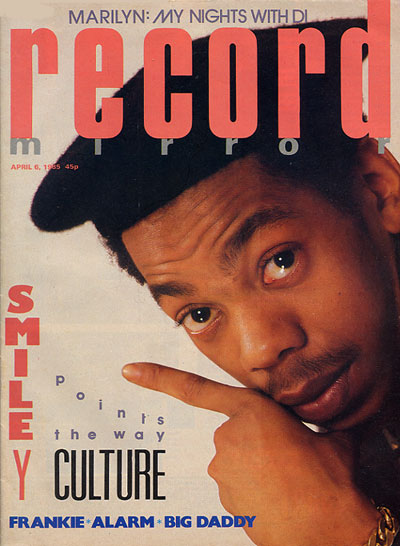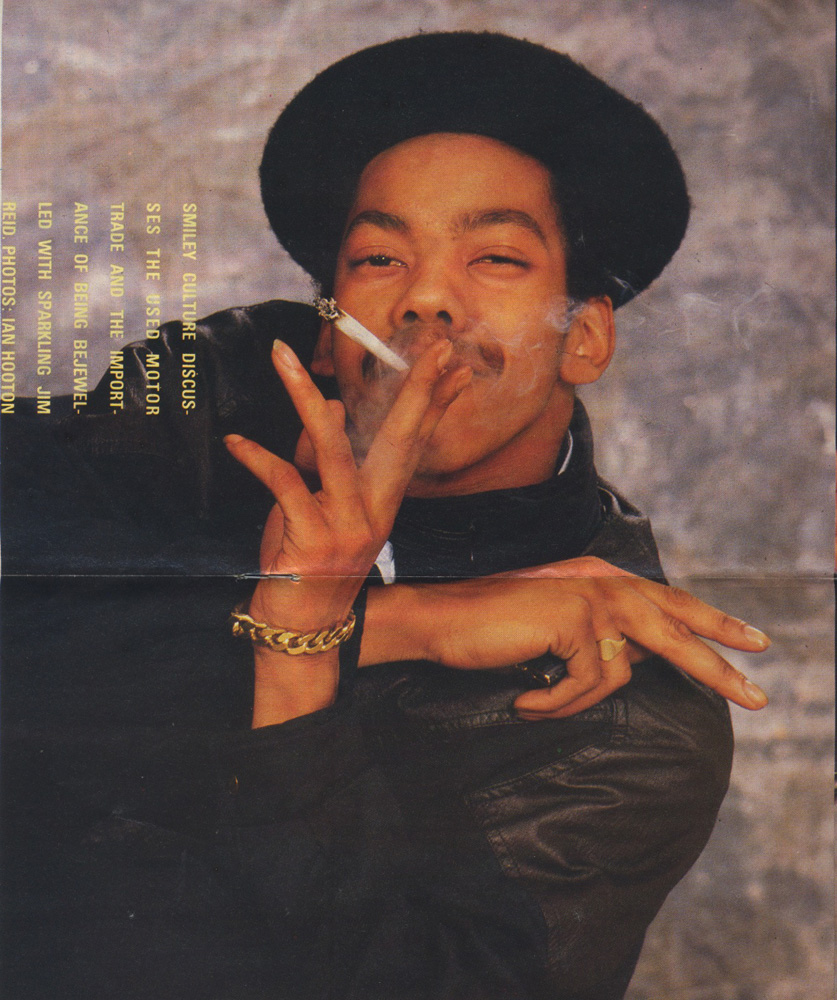DIG YA LATER ROOTS TRANSLATOR
USED MOTORS, now there’s a story. Car lots in Ilford, car auctions in Mile End. No MOT, no brake fluid, no questions asked. Worth a drink? I should … or rather Smiley Culture should, pal. ‘Cockney Translation’, that’s his Brixton ‘n’ Bow reconciliation, is also the translation of street sharp into hard cash.
“The first car I bought was a Morris Minor, they’re the worst cars on the road,” he says. “I was 14 years old, I wasn’t old enough to drive. I was still going to school.”
“That’s how I met this geezer. He used to go to the car auctions all the time and I used to go up and see him. The first time I went to Hendon I bought this Morris Minor off him. He drove it back to my place ‘cos I couldn’t really drive. The next day I was driving around the flats and it broke down. It never went again”
“So like an idiot I went back to him again to buy another car. That car was an Austin 1800 … it was completely terrible as well. He was always saying to me that he’d get me a great car and I was checking him regular.”
“He told me ‘Dave’,” (Smiley’s real name), “those first two cars were a load of shit. But I’m gonna get you a nice car ‘cos I like you.’ He was a villain, but a real Cockney.”
“Anyway, eventually he got me a Vauxhall Victor, which was really good. He never used to spend more than £70-£80 on a car, he used to drive them down to my place and I’d put one or two outside in the driveway. People I knew used to come round and ask me if the cars were for the sale. I’d do the business and make myself a little change. That’s how I really started meeting people all over the place.”
Smiley Culture now drives a Seven Series BMW. “I never used to work — ‘cos I’m the sort of person who’s hustling minded. I would go to a shop and buy 20 clocks for a good price and sell ’em for two or three pounds profit. I used to work for myself.” And he still does. Smiley’s fast style panorama of London — high rise holidays in Havana, more spare gold than Terry’s and strictly no fire damaged brollies — fell off the back of no lorry.
SMILEY’S TALK is the logical conclusion of a rap that started way back with Eddy Grant’s Equals. A big city hybrid, that stirs a witty, vibrant culture into an ever speeding kaleidoscope of catch phrases and well nurtured characters. Why, since the success of ‘Police Officer’ even the woodentops are cocking a shell-like…
“Y’know, I’m driving my car and it’s ‘Alright Smiley’ from the police,” he says.
“They don’t harass me at all. I was driving to do a TV programme and I drove through a red light, I was a bit late and there was a lot of traffic and things. I was just going through the lights and they changed from amber to red. I was just on the line, so I thought I’d go through, only there was a policeman standing there.”
“Next minute he’s tapping on my window saying, ‘I’d like to speak to you about a possible offence’. I said, ‘what officer?’ and he said ‘I’m not going to bend down and talk to you, step out of the car’. So I stepped out of the car and said, ‘Officer, officer before you say anything, let me show you something’ — ‘cos I had some of my records in the back”
“So I went round the back of the car and he came with me, I could see he was going to get real cocky, so I opened the boot of the car and said here have one of these. He looked at me and looked at the record and said, ‘I thought I recognised you from somewhere’.”
“I told him I was on the way to do a TV show and that’s why I was so fast … it could have been a problem, but it wasn’t, he let me go”
“I’ve had a lot of policemen tell me they’ve bought ‘Police Officer’. A lot of policemen have paid their fair share of promoting it — cos a lot ’em bought it — so respects due all round.”
SMILEY SMILES at this and flashes me some pretty tasty jewellery. Like the cars, the gold rings are just one more manifestation of wideboy flash…
“Since I was a youth I’ve liked jewellery,” he says. “I think a lot of the youth like jewellery. I don’t buy rings just for the sake of buying ’em though, I know that if I need to one day I can sell them.
“I don’t really go out of my way to buy stuff. I know quite a few people in the business. I know people in Hatton Garden. My personal jeweller is in Clapham Junction and they make jewellery for me at trade prices.
“If I’ve got anything old that I want to change they can melt it down and make something of it. Jewellery is very expensive and I don’t really buy anything unless I can get it at the scrap price. I mean I’m not into jewellery like Mr.T.”
Flash aside, the likeable Mr Culture has had to adjust to being the UK’s biggest home grown reggae performer. A pole position that has not only thrown him into the maelstrom of the musicbiz, but has earned the respect of the West Indian community. Does he welcome or fear the ‘spokesman’ or ‘figurehead’ epithets this may encourage?
“It’s a good thing, but I’m not sure that’s what I want to be in life,” he says. “There’s some people who’d love it — I personally just wanna be myself.” Smiley has similar views about the musicbiz. Don’t expect to see him gracing the tabloids’ gossip pages…
“I don’t wanna change, I just wanna be the way I am,” he says. “I don’t want to be a pretender. I think if you get involved in the business one hundred per cent you have to change”
“You have to leave a lot of people behind — and that’s not the way I was brought up. It’s not the way I check things. That’s the only thing that’d make me think the musicbiz is a bit dodgy”
“I’ve already achieved more than I thought I ever would. I never thought I want to be a big star like Bob Marley, the biggest thing in my life was to make a record. But I never thought any record I’d make would be played on the radio, that’s the way I checked myself.
“When ‘Cockney Translation’ originally came out (last summer) and got to number one in the reggae charts, that was enough for me, I could have given it up then. I’ve been doing it for 10 years now and seven or eight of those years I wasn’t even getting paid”
“But I was enjoying it. Now it’s turning into work. I don’t know whether the change is worth it, money isn’t everything.”

